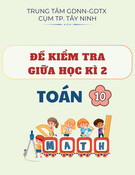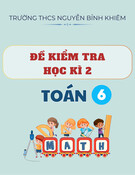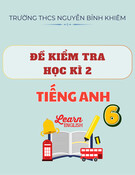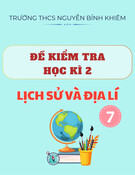
1
Sở GD & ĐT Vĩnh Long ĐỀ THI HSG TỈNH VĨNH LONG
Trường THPT chuyên Môn: tiếng Anh
I. LISTENING
Part A. You will hear a couple talking to a reporter about their work looking after wild animals in
Namibia. As you listen, choose the best answer A, B or C.
1. Lise and Wayne had always been interested in
A. studying photography.
B. raising cattle.
C. observing animals in their own habitats.
2. They raise money for their centre by
A. taking in visitors as paying guests.
B. asking international organizations for help.
C. farming the surrounding countryside.
3. What eventually happens to the animals they look after?
A. They are sent to safari parks.
B. They are released into the wild.
C. They become part of the family.
4. The family try to train the animals to
A. avoid electric fences.
B. be more independent.
C. stay away from cattle.
5. What kinds of animals do they have at the centre?
A. babies without mothers
B. all different types of creatures
C. mainly cheetahs
6. What sort of success have they had trying to put the creatures back into the wild?
A. They have released about 160 big cats.
B. They have released about 116 big cats.
C. They have released about 52 cheetahs.
7. How does Lise feel about animals?
A. She’d die of boredom.
B. She loves the bugs.
C. She loves all the animals.
8. What do Lise and Wayne think about their way of life?
A. Lise misses her town life.
B. They are both very happy there.
C. Wayne would like more free time.
Part B: You will hear an interview with Hans Zimmer, who writes soundtracks (that is the music) for
films. For questions 1-7, choose the best answer A, B or C.
1. The film directors he deals with appear to be mainly
A. confident.
B. nervous.
C. aggressive.
2. He was chosen to write the music for The Lion King because
A. he was recommended by a famous composer.
B. he had experience of working with animation.
C. he had written some music which the directors liked.

2
3. When Zimmer writes music of films, he tries to
A. make the story easier to follow.
B. express things the director hasn’t shown.
C. forget about parts of the story.
4. Zimmer says the best tunes come to him
A. when he is relaxed.
B. when he is in the bath.
C. when he gets up early.
5. He says that he produces most of his work
A. when he is under pressure.
B. by working regularly.
C. when he has plenty of time to think.
6. How long does it take Zimmer to write the soundtrack for a film?
A. several years
B. three to four weeks
C. it varies
7. What does Zimmer say he is going to do?
A. take a two-month holiday
B. refuse most new projects
C. work for a further five years
II. GRAMMAR & VOCABULARY:
A. Choose the best answer:
1. I came to Spain in 1982. Next year I (be)………… here 20 years.
A. will have been B. will be C. was D. am
2. My doctor prescribed me some medicine for my cough.
I ………… some medicine for my cough.
A. have prescribed B. prescribed C. had prescribed D. was prescribed
3. Where on earth is Tony? I'm tired of waiting for him. Soon we (wait)………… here for an hour.
A. will have been waiting B. will wait C. wait D. waited
4. He's usually pleasant, but when he's tired he (be) ………… pretty short-tempered. That's the way he is.
A. was B. is C. had been D. will be
5. Sorry I didn't call you and tell you I wasn't coming. I would have called you if I (have) ………… your
number with me.
A. will have B. had C. have D. had had
6. He says that if he (not/be) ………… so busy he would go with you to the movie tomorrow. As it is, he
simply has too much work to do.
A. is B. had been C. wasn't D. is not
7. Someone burgled my house while I was away.
My house ………… while I was away.
A. would burgle B. burgled C. had been burgled D. was burgled
8. While I was away on holiday, my sister (fall) ………… ill and I had to come home.
A. will fall B. falls C. had fallen D. fell
9. I gave my friend directions to my house, but later realised that I (forgot) ………… to give her the exact
address.
A. forgetting B. forget C. had forgotten D. forgot
10. I got to work this morning and was angry when I saw that no one (arrive) ………… yet.
A. arrived B. had arrived C. has been arrived D. will arrived
11. Sunshine - at last! Imagine if the English weather was like this all the time. (it/not/be) ………… wonderful?
A. Will it not be B. Wouldn't it be C. Had it not been D. Is it not
12. She’s pleased with her job, but when she's tired she (be) ………… very angry.
A. is B. was C. had been D. would be
13. We (miss) ………… the bus unless you hurry.
A. miss B. would miss C. had missed D. will miss

3
14. I went to the showroom but was informed that they had sold all the houses.
I went to the showroom but was informed that all the houses ………… .
A. had sold B. sold C. are sold D. had been sold
15. By the time we reached Frankfurt I (already/be) ………… very tired of driving.
A. am already B. will be C. was already D. would be already
16. He awoke thinking he was in a prison and that he'd been arrested for robbery. He then realised that it
(all/be) ………… just a bad dream.
A. has all been B. will have all been C. had all been D. is all
17. Do you think you (finish) ………… writing that report by the time I get back?
A. will finish B. would finish C. finish D. will have finished
18. If you (not/be) ………… so stubborn you would find it a lot easier to keep your friends.
A. were B. weren't C. would not be D. had not been
19. John would have waited for you if I (tell) ………… him the truth.
A. had told B. told C. have told D. would tell
20. Mary agrees that if she (not/be) ………… so busy she would enjoy the party tomorrow. As it is, she has
much homework to finish.
A. was B. had not been C. had been D. wasn't
B. Circle A, B, C or D to identify the word or phrase that is incorrect in each line to complete the
passage.
1. There are much more water than land on the surface of the earth. The seas and
A B C D
2. oceans cover nearly four-fifth of the whole world, and only one-fifth of its land.
A B C D
3. That distribution affects all nations that living in different parts of the planet earth
A B C D
4. If you are traveling over the earth in different directions, you would have to spend
A B C D
5. much more of your time moving on water rather than on roads or railways.
A B C D
6. forget sometimes that in every mile of land there are four miles of water.
A B C D
7. There is too much of water on the surface or our earth that we have to use two
A B C D
8. words to describe them. We use the word seas to describe those parts of water
A B C D
9. surface which is only a few hundreds of miles wide, and the word OCEANS to
A B C D
10. describe the huge areas of water are thousands of miles wide and very deep.
A B C D
C. Circle A, B, C or D to choose the most suitable form of the words to complete the following passage
There are many ways of (1)…………. without using speech. Signals, signs, symbols and gestures may
be found in every known culture. The basic function of a signal is to impinge upon the environment in such a
way that it attracts (2)…………., as for example, the dots and the dashes of a telegraph circuit. Codes to refer to
(3)…………., the potential for communication is very great. While less (4)…………. to the (5)…………. of
words, signs contain greater meaning in and of themselves. A stop sign or a barber pole conveys meaning
quickly and (6)………….. Symbols are more difficult to describe than either signals or signs because of their
intricate (7)…………. with the receiver’s culture (8)………….. In some cultures, applauding in a theatre
provides (9)…………. with an auditory symbol of (10)…………. Gestures such as waving and handshaking
also communicate certain cultural messages.

4
1. A. communication B. communicating C. communicator D. communicative
2. A. attentive B. attending C. attendance D. attention
3. A. speak B. speech C. speaking D. spoken
4. A. adapt B. adapted C. adaptable D. adapting
5. A. code B. codify C. codes D. codification
6. A. conveniently B. convenience C. convenient D. conveniencing
7. A. relative B. relation C. relationship D. relations
8. A. perceive B. perception C. perceiving D. perception
9. A. perform B. performance C. performers D. performing
10. A. approve B. approval C. approving D. approvals
D. Read the letter and choose the correct tense of each verb to fill in the blanks
Dear Sir,
I (1)……….. to you three weeks ago, asking about conditions of entry into your college. You
(2)……….., enclosing an enrolment form, which I (3)……….. and returned without delay. Since then,
however, I have heard nothing and I begin to wonder if my application (4)……….. astray.
Could you please check that you have received it? And if you haven’t, please send me another enrolment
form. If, on the other hand, you received my application but (5)……….. whether to accept me as a student or
not, I would be very grateful if you (6)……….. me when I may expect to hear your decision. Finally, if my
application already (7)……….. refused, I would like to be informed as soon as possible because if I do not get
into your college I (8)……….. to apply to another and the sooner I (9)……….. this, the better chance I
(10)……….. of being accepted.
Yours faithfully,
P. Smith
1. A. write B. had written C. have written D. wrote
2. A. replied B. did reply C. reply D. will reply
3. A. am filling up B. was filling up C. have filled up D. filled up
4. A. went B. has gone C. goes D. will go
5. A. don’t decide B. will not decide C. have not decided D. will be deciding
6. A. told B. had told C. have told D. are telling
7. A. is already B. would already be C. has already been D. will already been
8. A. had B. will have C. would have D. am having
9. A. did B. have done C. had done D. do
10. A. had B. will have C. will have had D. had had
E. Read the passage then choose the best answer to fill in the blanks:
Last week I went to visit my friend Fred. Fred is a great guy but at times he can really go (1)………… about
things. We were speaking about some of our friends and he came (2)………… this incredible story about Jane.
It seems she had butted (3)………… while he was harping (4)………… his favorite complaint: Service in
restaurants. Apparently, he had been running (5)………… for quite a while putting (6)………… almost every
restaurant he had been to by rattling (7)………… a list of his visits to different restaurants in town. I guess Jane
felt that he was talking at her and was fed up with it. She went off about what a rude person he was which shut
him (8)………… pretty quickly! I thought about blurting (9)………… that maybe she was right, but decided to
clam (10)………… in order to not upset him.
1. A. at B. in C. on D. up
2. A. out with B. down C. about D. under
3. A. in B. of C. off D. out
4. A. around B. up C. into D. on
5. A. to B. on C. out with D. in
6. A. down B. about C. after D. up
7. A. of B. off C. on D. outside
8. A. out of B. on C. into D. up
9. A. around B. up C. out D. at
10. A. at B. on C. up D. in

5
F. Read the following passage, then choose the best articles to fill in the blanks
(1)……….. most alarming thing about (2)……….. food scene at the moment is the doubt in the minds
of many about the safety of some of our most widely used products. Take aspartame, the sugar substitute. In the
United States, as much as $100 million has been spent in some years advertising it. Aspartame, under its brand
name Nutra Sweet, is found in practically every low-calorie soft drink.
But how safe is it? For quite (3)……….. while, there has been doubt surrounding the research that was
conducted to prove the safety of Nutra Sweet. The task force set up by the US Food and Drug Administration to
approve Nutra Sweet ran into difficulties when it felt it couldn’t rely on (4)……….. integrity of basic idea the
firm had submitted.
Last (5)……….. July, Dr Erik Millstone of the University of Sussex submitted (6)……….. dossier to
the Department of Health alleging criminal fraud in the approval of aspartame in (7)……….. United States and
he finds it strange that three of the 14 members of the Committee on Toxicity in this country have (8)………..
financial links with the artificial sweetener industry.
I’ve been reading (9)……….. book by (10)……….. American doctor who claims that aspartame can
cause headaches, convulsions, memory loss and diarrhea. He has collected a mass of anecdotal evidence that
has convinced him that aspartame is not as safe as the makers claim. As it is now used in some 1.200 products,
the opportunities for ingesting aspartame are virtually unlimited.
1. A. an B. a C. the d. no articles
2. A. the B. no articles C. a d. an
3. A. a B. the C. an d. no articles
4. A. no articles B. an C. the d. a
5. A. the B. a C. an d. no articles
6. A. a B. the C. no articles d. an
7. A. a B. no articles C. the d. an
8. A. an B. the C. a d. no articles
9. A. a B. an C. the d. no articles
10. A. no articles B. an C. a d. the
III. READING
A. Read the following passage then choose the best answer to complete each blank:
Can you imagine what Edison’s life was like in the years after he had invented the electric lamp?
Many things had to be invented and built before electric lamps could really (1)………. by all; machines to
(2)………. the electricity each home or office used; things (3)………. it certain that the electricity in the wires
did not (4)………. fires; things to send electricity (5)………. the right places.
Everything that was (6)………. had to be thought of and (7)………. by Edison and the men who worked
(8)………. him. There was no place where they could buy the things they (9)………... Edison made 360
inventions (10)………. in order to send electric power to (11)………. it was wanted.
Edison directed all the work himself; (12)………. new machines, putting wires underground, fixing lights, and
so on. He (13)……….to be everywhere at the same time. He wanted his men to do as much as he (14)………..
But he (15)………. asked them to do things he (16)………. would not do or could not do.
He had never thought much about regular hours for sleep; nor he often (17)………. completely about sleeping.
He (18)………. for a few minutes at a time, in the middle of the night, in an underground room at his power
station, (19)………. a metal box for his bed. (20)………. these days, he almost never saw his wife and their
children.
1. A. use B. used C. be used D. be using
2. A. measure B. test C. obtain D. take
3. A. make B. to make C. making D. to be make
4. A. like B. put C. start D. begin
5. A. to B. by C. at D. in
6. A. obtained B. accepted C. tried D. needed
7. A. building B. built C. was building D. builds
8. A. about B. near C. with D. together


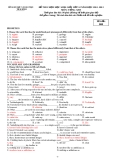
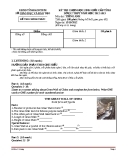
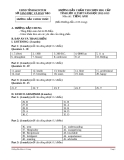
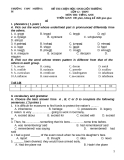
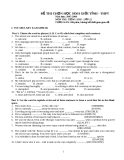
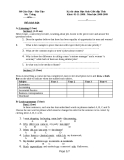
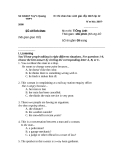
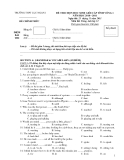
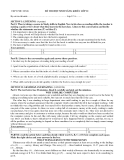

![Đề thi Tiếng Anh có đáp án [kèm lời giải chi tiết]](https://cdn.tailieu.vn/images/document/thumbnail/2025/20250810/duykpmg/135x160/64731754886819.jpg)
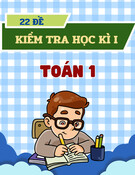



![Đề thi học kì 2 Vật lý lớp 11: Đề minh họa [Mới nhất]](https://cdn.tailieu.vn/images/document/thumbnail/2025/20250709/linhnhil/135x160/711752026408.jpg)
